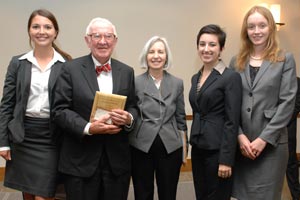On April 25th, Harvard Law School celebrated Justice John Paul Stevens’ 35 years of service on the Supreme Court with an event honoring his work and his contributions to the fields of environmental, energy, and natural resources law.
In her introduction, Dean and Jeremiah Smith, Jr. Professor of Law Martha Minow said that Justice Stevens’ crucial leading role in environmental law follows his attention to facts and his ability to cut through the fog to bring reason to bear in the midst of high emotion, high drama, and sometimes boring detail. That focus on facts, she said, is “among the dimensions for which Justice John Paul Stevens has set the standard defining what a great judge is.”
Howard and Katherine Aibel Professor of Law Richard Lazarus (right, with Stevens), who led the program, said that Justice Stevens earned his reputation as the environmental law steward on the nation’s highest Court as he time and again safeguarded the laws from attempts to weaken them.
“Environmental laws challenged the nation to do no less than redefine the relationship of humankind to the natural environment, in order to protect our air, water and lands,” he said. “Those laws inevitably challenged very powerful political and economic interests and institutions. The strength of Justice Stevens’ jurisprudence lay in his willingness to embrace the clear policy import of the nation’s new laws.”
Lazarus said that Justice Stevens was not an environmental justice in the sense that he was willing to substitute his own view of proper environmental policy for that of Congress. In fact, the force of his jurisprudence was that he thought the court should not do so. He persistently relied on the plain meaning of the language that Congress had used in drafting the laws.
The Harvard Law School Environmental Law Society presented Justice Stevens with HLS’s first Horizon Award, an award for outstanding contributions to the fields of environmental, energy, and natural resources law. The students pointed out that the award, crafted out of renewable bamboo, is itself sustainable. And to laughter from the audience, they presented the bowtie-bedecked Justice with a bowtie that depicts climate change.
After the award ceremony, Honorable S. William Green Professor of Public Law David Barron, a former clerk to the Justice, held a conversation with Justice Stevens about his service on the Court and about his recent book, Five Chiefs, which discusses the five different Chief Justices with whom he worked. Justice Stevens also discussed some controversial cases that the Court is facing today and has decided in the past, including Bush v. Gore, which he said greatly damaged the independence of the judiciary.
“I do think it was a most unfortunate decision, largely because of its impact not only on the Supreme Court itself but on other judges in other courts. I think it did create the impression that judges weren’t acting as judges should act in many respects,” Justice Stevens said. He noted that he does not find the Affordable Care Act challenge similarly troubling because there is legitimate conflict over the law, regardless that the issue has become politically charged.
He also spoke more generally about the inner workings of the Supreme Court, touching upon pre-conference discussion between the justices, the shifting dynamics of the Court when a new justice joins, and the impact of oral arguments on the justices’ deliberations.
“I’ve often been surprised at the difference between what happens at oral arguments and what happens at conference and in considerations down the road. I can’t tell you how often my mind has been changed during conference and the minds of my colleagues have been changed,” he said. “My colleagues are people who recognize their own responsibility to get to the right answer, and I think they act in good faith.”
